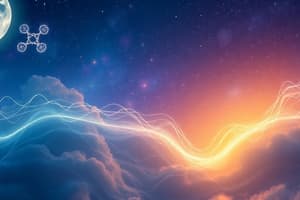Podcast
Questions and Answers
What hormonal process is primarily triggered by low levels or short durations of ambient light?
What hormonal process is primarily triggered by low levels or short durations of ambient light?
- The release of cortisol
- The release of dopamine
- The release of epinephrine
- The release of melatonin (correct)
Which type of sleep is characterized by slow brain waves and does not include dreaming?
Which type of sleep is characterized by slow brain waves and does not include dreaming?
- Stage N2 sleep
- REM sleep
- Lucid sleep
- Non-REM sleep (correct)
What happens to our muscles during REM sleep?
What happens to our muscles during REM sleep?
- They partially contract
- They shut down (correct)
- They become energized
- They remain highly active
What primarily characterizes REM sleep in contrast to non-REM sleep?
What primarily characterizes REM sleep in contrast to non-REM sleep?
Which sleep disorder is characterized by loud screams and intense panic, primarily experienced in childhood?
Which sleep disorder is characterized by loud screams and intense panic, primarily experienced in childhood?
According to Freud's analysis of dreams, what is the latent content of a dream?
According to Freud's analysis of dreams, what is the latent content of a dream?
Which theory suggests that dreams are interpretations of random neuronal firings in the brain?
Which theory suggests that dreams are interpretations of random neuronal firings in the brain?
Which of the following sleep disorders involves grinding teeth during sleep?
Which of the following sleep disorders involves grinding teeth during sleep?
Which brain wave pattern characterizes stage N1 sleep?
Which brain wave pattern characterizes stage N1 sleep?
What is the main characteristic of stage N2 sleep?
What is the main characteristic of stage N2 sleep?
Which of the following is a sleep disorder related to difficulties in maintaining sleep?
Which of the following is a sleep disorder related to difficulties in maintaining sleep?
Flashcards are hidden until you start studying
Study Notes
Sleep Overview
- Sleep is a universal biological process essential for health and well-being.
- Influenced by ambient light; low light triggers melatonin release, aiding sleep onset.
- Falling asleep and waking up constitutes a significant nightly experiment for individuals.
Brain Activity During Sleep
- Brain remains active during sleep; EEG monitors track brain waves and activity, challenging the idea of sleep as complete inactivity.
- Sleep consists of a consistent pattern of stages lasting about 90 minutes.
Sleep Stages
-
REM Sleep:
- Accounts for 25% of total sleep time, characterized by rapid eye movements and dreaming.
- Awareness of external events is reduced; consciousness dominated by internally generated imagery.
- Muscle relaxation occurs to prevent injury from acting out dreams.
-
Non-REM Sleep:
- Deep sleep characterized by very slow brain waves, further divided into three stages:
- N1: Drowsiness, loss of muscle tone, potential for jerks or hallucinations.
- N2: Represents about half of total sleep time; characterized by theta waves and sleep spindles.
- N3 (Slow Wave Sleep): The deepest sleep stage, associated with delta waves; sleep abnormalities such as sleepwalking and nightmares occur herein.
- Deep sleep characterized by very slow brain waves, further divided into three stages:
Reactivity During Sleep
- Individuals can react to external stimuli even during deep sleep (e.g., smoke, baby crying).
Cycles of Sleep
- Sleep cycles alternate between REM and non-REM stages, with REM episodes increasing in duration throughout the night.
- Dreams tend to become more vivid and elaborate as sleep continues.
Importance of Sleep
- Sleep is vital for maintaining normal brain function; inadequate sleep can lead to various health issues.
- Common sleep disorders include:
- Insomnia: Difficulty falling or staying asleep.
- Sleep Apnea: Characterized by pauses in breathing.
- Narcolepsy: Extreme daytime sleepiness.
- Sleep Terrors: Common in children, involving panic and loud screams.
- Bruxism: Teeth grinding during sleep.
- Restless Legs Syndrome: Uncomfortable sensations in the legs.
- Periodic Limb Movement Disorder: Sudden involuntary limb movements.
- REM Sleep Behavior Disorder: Acting out dreams during REM sleep.
Health Effects of Sleep
- Optimal sleep linked to longevity and better overall health.
- Insufficient sleep impairs immune function and may contribute to obesity and cognitive decline.
- Increased sleep during illness helps combat infections.
Dreams and Their Significance
- Dreams consist of images, thoughts, and emotions, primarily occurring during REM sleep.
- Most dreams are forgotten upon waking; approximately two-thirds are primarily visual.
- Sigmund Freud's theories suggest dreams function as wish fulfillment, differentiating between manifest and latent content.
- Activation-synthesis theory posits dreams are the brain's interpretation of random neural firing during sleep.
Theories on Dreaming Functions
- Memory Consolidation: Dreams strengthen memory and recall.
- Emotion Processing: Engaging with emotions in dreams may aid emotional management.
- Mental Housekeeping: Clearing unnecessary information during sleep.
- Instant Replay: Reviewing recent events through dreams.
- Incidental Activity: Dreams may be a by-product of sleep without essential purpose.
Tips to Remember Dreams
- Replay dream details mentally upon waking.
- Keep a dream journal to record details quickly.
- Aim to wake up peacefully without abrupt interruptions.
- Affirm commitment to dream recall before sleeping.
Managing Nightmares
- Identify and reshape nightmare narratives for better outcomes.
- Seek professional help for persistent nightmares or underlying disorders.
- Improve sleep hygiene to foster better sleep quality:
- Maintain a stable sleep schedule.
- Avoid stimulating content before bedtime.
- Wind down with relaxation techniques.
- Limit caffeine intake and minimize distractions in the sleeping environment.
Studying That Suits You
Use AI to generate personalized quizzes and flashcards to suit your learning preferences.




